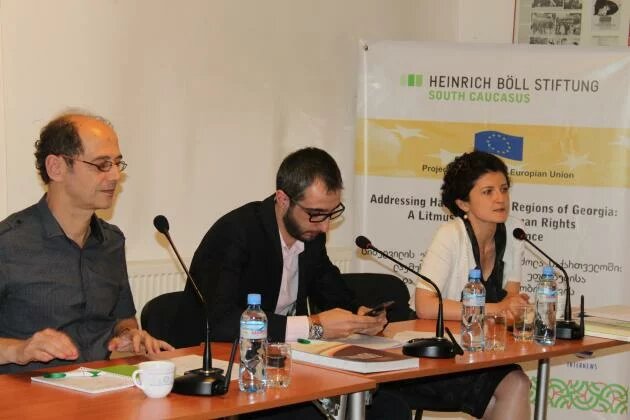
This discussion held in HBF’s office had fewer participants than other discussions. Both the moderator and speakers of the discussion presented their arguments regarding the public’s lack of interest towards human rights. “It seems that our society has a similar attitude towards human rights. Therefore, human rights are protected to the extent to which people pay attention to these issues according to the attitudes towards them. Or maybe public skepticism is so high that nobody believes that human rights will ever be protected here,” said Gogi Gvakharia to open this discussion.
“How can human rights become a popular subject in the country? Should the main foundation of modern Georgian statehood be based on human rights? What should the country be based on? Does the public agree that human rights are a central aspect of all issues?” Zviad Koridze, one of the speakers of the discussion, posed these key questions. Discussion unfolded in two directions: why human rights are not a popular topic in the country, and the Public Defender’s report.
Zviad Koridze believes that the public defender should be one of the first persons to play a significant role in promoting human rights. He should achieve this through “proactive, strict and often radical” evaluations. An Ombudsman that is too refined in his assessments will simply turn human rights topics into a bureaucratic institution. “I believe human rights are not a bureaucratic system – it is far more a humanitarian platform where we need an Ombudsman of strong pathos”, says Zviad Koridze. He also stated that annual reports prepared by previous Ombudsmen are also important, but these documents are part of history. “Now we need a more proactive approach.”
Tea Tsulukiani, Human Rights Advisor of the Chair of Free Democrats, shares Zviad Koridze’s perspective: “As for this pathos, I fully agree with Mr. Zviad, since we deal with an oppressed society on a daily basis. The law that Zviad criticizes brings such negative results that it would be a positive step if the Ombudsman supports citizens who have problems and protects us. This is probably an issue of resources. He may have a different temperament than his predecessors, but this does not diminish the seriousness of his work.” However, according to Tsulukiani, we should not forget that the Ombudsman is funded by the state budget; the Public Defender’s Office is not an NGO and it has the status of a state institution.
Tsulukiani thanked the Ombudsman and his team for their work, as a citizen of Georgia, and she said that this document contains serious conclusions, as “it fully fits the development of logic that Public Defender reports show over the past few years.” It includes facts, figures and recommendations, and it is a strong instrument for civic organizations and political parties, as well as citizens, regardless of their profession.
Giorgi Mshvenieradze, representative of the Public Defender, talked about the issues and specific topics reviewed in the Ombudsman’s report. Zviad Koridze also emphasized what he thought should have been included. He hoped that the Ombudsman would more thoroughly discuss the European Court of Human Rights’ decision in the Irina Enukidze v. Georgia case. He also believed that the Ombudsman should have provided longer comments on the “case of photojournalists, since when this issue came up in July, the Ombudsman was late to address it.” Koridze also hoped that the 2011 report would feature the case of journalist Tedo Jorbenadze. Furthermore, even though the Office of the Public Defender prepared a very interesting conclusion on the case of the student of public school #53, this issue was also not reflected in the report.
“This kind of statement may cause a lack of fulfillment of recommendations and our vision of resolving systemic problems could be pushed aside, as has happened before,” answered Giorgi Mshvenieradze, representative of the Public Defender, to the journalist. He talked extensively about the Public Defender’s report. He tried to review all of the chapters, including rights to a fair trial, licensing broadcasting, monitoring implemented by the Public Defender in prisons through a national prevention mechanism, and rights associated with freedom of association.
However, at the beginning of his speech, before talking about specific issues, Mshvenieradze noted a tendency: “During parliamentary review, the Public Defender’s reports do not traditionally trigger criticism towards executive, legislative or judicial branches of the government. Instead, some members of parliament, together with a certain segment of the civil society, start criticizing the report and the Ombudsman, asking why the report does not cover certain issues…We believe it is important that such criticism is also directed towards agencies that have committed rights violations, and more public attention should focus on eliminating such violations.”
